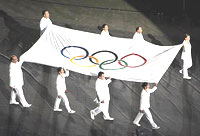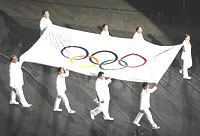Beijing 2008 Olympics and Africa

 |
| The Olympic Flag |
China has been criticized for its human rights record and had to fend off calls for boycott of Olympic games in China over its involvement in Darfur. It has also been accused of limiting its citizens’ freedoms by placing a security firewall on internet sites deemed critical of China. Over and above the fear of potential terrorist attacks, China is also faced with serious pollution problems. Already; Australian athletes have raised concerns over their health due to the smog measuring up to 1320 micrograms (said to be 26 times Australia standard for quality air!) that has descended on Beijing city.
The deliberate push to reinvent China's place in the world no-matter-what, is quite evident. Some commentators trace it back to the disastrous defeat China suffered in the hands of British troops in the 1840 - 1842 Opium War. China's ambition has over the years focused on the quest for recognition and reversal of the fortunes hence the drive towards the peaceful rise of the 'dragon.'
Africa may not have homogenous parallels as far as an African empire is concerned; but the leadership does have a background of failure that makes them be indebted to the upcoming generations. For instance, African leaders in the 16th Century played a role in Slave Trade that saw an estimated 11 million Africans uprooted from their homes and shipped to foreign lands. In the 19th century, leaders in post colonial Africa outrightly ran down African economies and failed to offer leadership when geopolitical interests ran against the interests of African people.
 |
| Inside the Olympic Stadium in China |
As in China, a majority of African leaders have no good human rights record; they have prevented Africans from accessing information about their own government activities. It is easier for Africans to narrate governance issues in say, the United States of America and Europe (among other countries) than it is to describe their own government activities. African leaders always hide in some sort of 'official secrets law' to deny their citizens information; hence what is going on in Africa-one has to get data from donor agencies! Through poor policies, Africans have been denied access to internet, electricity and open media.
Talk of pollution...walk in major cities in Africa and your nose can help tell the amount of diesel and petrol in the air. Air quality standard is no priority (everyone is struggling to get food!) because of the many cars that emit exhaust containing incomplete fuel combustion. The living standard of the poor citizenry especially in the cities is appalling: no sewer, no access roads, and no water - this is life at its most brutal level! Unfortunately for Africa, were Olympics to be hosted in our capitals, all these will be turned into major poverty tourism sites!
African leaders can draw lessons from China's quest to right the historical wrongs they have committed to their people by seeking to propel their country to global relevance. That very quest has led to China involuntarily opening itself up to the World. The major powers of the World are descending on Africa for its command of 13% of known oil reserves - what are our leaders doing to ensure that that this quest for oil makes Africa a better place for all? South Africa will be hosting the 2010 World Cup; what is our leadership doing to ensure that African entrepreneurs take advantage to position their businesses in the global economy?
Clearly, the Beijing 2008 Olympic Games offer a strong lesson for Africans to learn to be competitive and use past mistakes to energize positive strategies for the future. The Chinese are not hosting Olympics to merely earn revenue from the sports; they are positioning themselves globally.
South Africa and by extension Africa ought not to host the 2010 World Cup to simply generate revenue; Africans must use it to reposition the continent as the next frontier for big business and stability.
